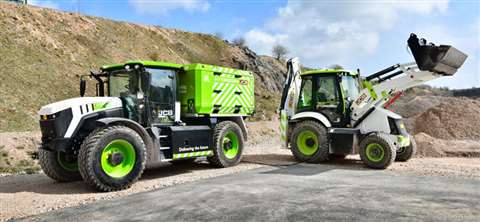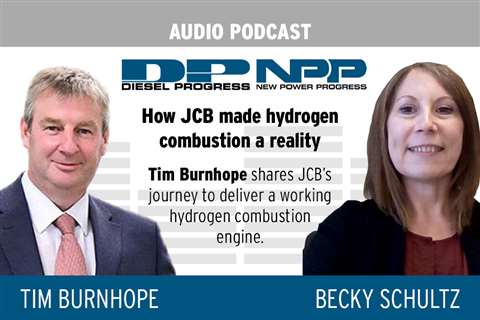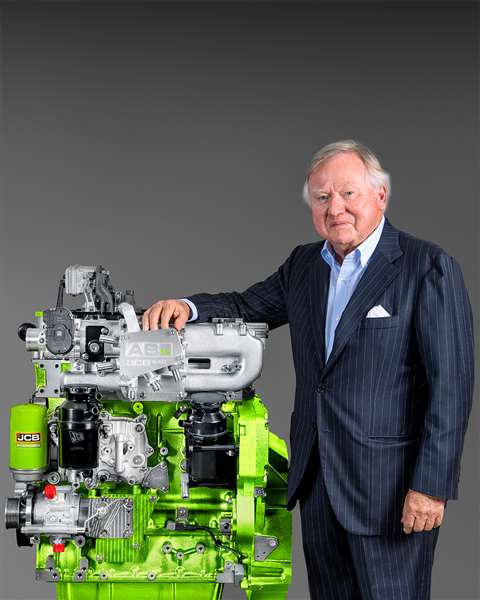JCB’s hydrogen engine: ‘We weren’t sure whether it was possible’
28 March 2023
 JCB’s hydrogen refueller refuels a hydrogen-powered backhoe loader (Image courtesy of JCB)
JCB’s hydrogen refueller refuels a hydrogen-powered backhoe loader (Image courtesy of JCB)
The team that developed JCB’s hydrogen combustion engine, shown off to the public for the first time at ConExpo/Con-Agg 2023, weren’t initially sure if the technology behind would work after a string of earlier research projects failed in their objectives.
That’s according to UK-based OEM’s chief innovation and growth officer Tim Burnhope.
JCB unveiled its new engine at the start of this year, having tested a 4.8L version producing 70kW in a backhoe loader, alongside a prototype hydrogen-powered telehandler.
The company has invested £100 million (US$120 million) in the new hydrogen combustion engine.
Speaking to International Construction’s sister publications Diesel Progress and New Power Progress in an exclusive podcast, Burnhope said: “This is a spectacular solution for the world to get to net zero much quicker, not relying on precious metals and high cost and a new supply chain that we may never get to.”

Past studies raised doubts
But there was initial uncertainty over whether or not the engine could work.
JCB partnered with Aachen University in Germany to develop a design for the engine. They studied 76 papers, mostly by universities and top companies, which had been unable to find a successful outcome, Burnhope said.
 Lord Bamford says that JCB has made enormous strides in a short space of time to develop a hydrogen internal combustion engine
Lord Bamford says that JCB has made enormous strides in a short space of time to develop a hydrogen internal combustion engine
“I think most companies in the world would have been put off but that but we saw it as a real opportunity and a challenge,” he said.
Burnhope said JCB saw that in most cases, previous studies had taken a spark ignition engine and tried to put hydrogen into it.
“The problem was the combustion was probably high pressure, high temperature. The fuels were probably way too rich. So the outcomes were fairly poor.”
He added that several studies concluded that if they had been able to combust hydrogen at a lower temperature and pressure, the engine could have been successful. But some of these academic studies run by universities did not have the resources to then redesign the engine.
Another piece of the puzzle was how to develop a lean fuel mixture, with a small amount of hydrogen to a large content of air. Burnhope explained that in the ‘90s, when several of these studies were conducted, turbochargers to achieve this weren’t available but are now.
Meanwhile, advances in computer technology meant that JCB was able to work with Aachen University to model designs virtually in a computer and check that they were accurate using mechanical tests in a lab.
“Having that computer power, a lot more experts and a lot more lab technology – that was really the breakthrough,” he said.
“We took the 76 papers and we found 11 root causes that we needed to fix. We put teams onto [each of] those. But the majority of them go back to how you combust hydrogen in the first place and that pretty much fixes all of them.”
JCB opted to develop a 4.8L 70kW engine because the majority of its engines range from 55-75kW. “What we wanted to do was to make sure we had a practical solution for the majority of products that we sell in our range,” Burnhope added.
Overcoming engine performance concerns
Meanwhile Burnhope said the manufacturer had managed to allay concerns about the performance of hydrogen combustion engines, relative to diesel engines.
He said, “We read a lot of these papers and they would argue that you can’t get the same low-end torque if you use a hydrogen combustion engine.
“Some of them said it wouldn’t be as efficient. Some of them said you could have flat spots [in power]. But the turbos weren’t necessarily perfected to suit. We made it very clear to our design team on engines…not to listen to any of those papers. Those papers didn’t quite get the engines to work.
“So amazingly as we went through those [design] iterations, we got the combustion to work and then we have refined and refined so we have got low-end torque perfect, if not slightly better. We have got the engine to be more efficient in the area where we use the engine most, and so it is really interesting where it really works. But we have got all of the characteristics now. So if you were to jump onto a backhoe today, jump off and jump onto a hydrogen backhoe, as an operator there is no difference at all until you come and fuel the machine.”
Next steps
Burnhope acknowledged that the relatively low availability of hydrogen fuel meant that it would take key customers time to understand the product and where to secure a supply of hydrogen.
But he noted that in the US, the government has committed $7 billion to develop six to 10 ‘clean hydrogen hubs’ and he expected fleets of hydrogen-powered construction machines to develop around these hubs.
In the meantime, JCB is working to validate the engine and the machines they power to get them to a level for production. “We are well into that now with a lot of machines up and running,” he added.
And he asserted that hydrogen combustion engines could enable construction sites to go net zero more quickly without relying on the precious metals used in electric machines and at a more affordable cost.
“People adopt technology when it is affordable and when it is very similar to what you are using today. Operators will use these machines the same way and sell them as second machines in the same way. They will be able to go anywhere in the world as hydrogen is adopted. People can service these machines – the engine is pretty much exactly the same apart from four spark plugs. It is exactly the same so it gives people confidence because they know how to work the technology,” he said.
STAY CONNECTED




Receive the information you need when you need it through our world-leading magazines, newsletters and daily briefings.
POWER SOURCING GUIDE
The trusted reference and buyer’s guide for 83 years
The original “desktop search engine,” guiding nearly 10,000 users in more than 90 countries it is the primary reference for specifications and details on all the components that go into engine systems.
Visit Now
CONNECT WITH THE TEAM










